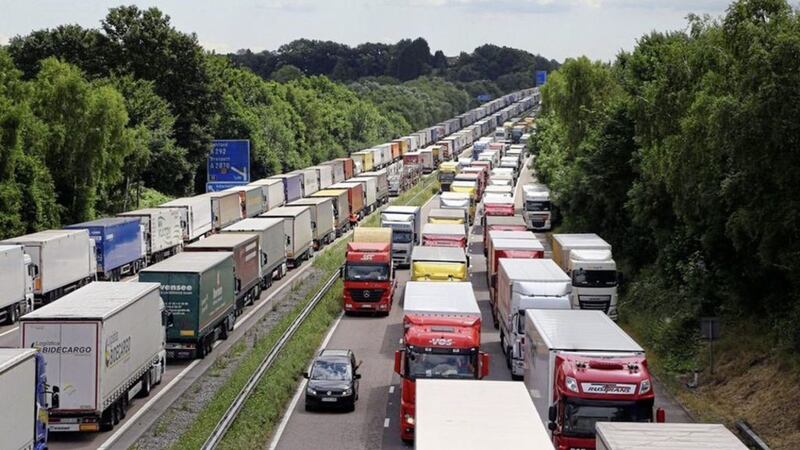A FORMER British minister has warned of the danger of “gridlock on the roads of Northern Ireland” on the first day after Brexit.
Labour MP Yvette Cooper, who chairs Westminster’s powerful Home Affairs Committee, claimed a lack of contingency planning for customs arrangements risks “Brexit border chaos”.
A committee report recalls scenes in July 2015 when a strike by French ferry workers saw enormous traffic queues in southern England, with ‘Operation Stack’ launched in response.
Ms Cooper, pictured, said: “As things stand, the government is running the risk of celebrating their first day of Brexit with the sight of queues of lorries stretching for miles in Kent and gridlock on the roads of Northern Ireland, which would be incredibly damaging to the UK economy and completely unacceptable to the country.
“Contingency planning is essential. If the government gets this all wrong, we could be facing Operation Stack on steroids.”
MPs cited huge disruption witnessed two years ago following a strike by French ferry workers and a dramatic surge in attempts by migrants to reach Britain from Calais.
The Home Affairs Committee, made up of Conservative, Labour and Scottish MPs, flagged up the episode as the government's border planning for Brexit was described as "extremely unconvincing".
Customs is one of the issues under the spotlight in Brexit negotiations.
Goods worth hundreds of billions of pounds are traded between the UK and the EU every year.
The committee argued that the outcome that would cause the least upheaval would be keeping the status quo for customs arrangements.
If this is not possible, it said businesses and haulage operators urgently need details of what changes will be introduced.
The MPs criticised a lack of coordination across government, which was unable to specify which minister is responsible for border planning.
On Northern Ireland, the report said "it is clear that the impact on border and customs operations at the border with the Republic of Ireland will be severe in the absence of specific solutions to the very complex Brexit issues affecting the island of Ireland".
"Decisions on the way forward are needed as a matter of urgency including on infrastructure improvements, systems and capacity."
The report said plans to expand the 'trusted trader' system to cut bureaucracy could help with some of the specific challenges at the Irish border, but the government needed to do much more to inform traders and develop registration processes.
It is the second parliamentary committee to raise concerns about the issue this week.
The Public Accounts Committee also warned that failure to complete the introduction of a new customs system by the date of Brexit would be "catastrophic", with the number of declarations to be processed potentially increasing almost five-fold after the UK's departure from the EU.
Secretary of State James Brokenshire, answering oral questions in the House of Commons yesterday, said "we must aim to avoid any physical infrastructure on the land border".
"The success of the land border comes from the fact that it is seamless and invisible. We are resolute in ensuring this remains the case."
However, Sinn Féin claimed that by attempting to enshrine a Brexit date into law, the government "is accelerating towards a post-Brexit abyss with no progress made on protecting the rights and livelihoods of citizens in Ireland".
"With only fantasy solutions suggested to deal with avoiding an EU frontier across Ireland, and struggling in EU negotiations, the British government's Brexit plan is falling apart."
Another Westminster committee also heard warnings yesterday that a hard border could hit health services and the response to major emergencies on the island of Ireland.








